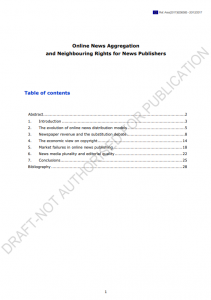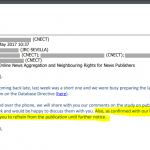 “Not authorized for publication”
“Not authorized for publication”While several factors have driven the decline in newspaper revenues and in the number of legacy newspapers, news aggregation has an opposite effect
The risks that may be created by news aggregation platforms for media plurality in news consumption cannot be addressed through copyright.
These quotes are not from the Pirate in the European Parliament nor from the chorus of copyright scholars who unequivocally oppose the introduction of an extra layer of copyright. Instead they are from a research paper by the European Commission’s own research center (JRC). If these quotes sound unfamiliar to you, this is no surprise: A 30 page paper panning the Commission’s copyright plans on press publishers written by JRC never saw the light of the day.
Thanks to a series of freedom of access requests, I have obtained a version of the draft paper that is as of today still unpublished by the Commission.
 DG CNECT in May 2017: do not publish!
DG CNECT in May 2017: do not publish!I also obtained parts of an email conversation in which the European Commission’s Directorate General CNECT orders the JRC to stop publishing the study, claiming higher authority. While these email conversations still have some gaps in it – there is a conspicuous silence between October 2016 and May 2017 – there are some conclusions that can be drawn from the Commission’s behaviour. And it is not looking good. JRC had planned to release the study in November of 2016. This would have been a very valuable contribution to the political debates around the Commissions copyright plans, but not the kind of contribution that the Commission would have hoped for. Instead, we see a paper trail that points toward a structural problem with the way that the European Commission is treating academic evidence. One can’t help but get the impression that the Commission will only proactively publish studies that fit its own political narrative, and will try to downplay the fact that it has been holding back studies when somebody starts digging.
What the paper says
…a paper trail that points toward a structural problem with the way that the European Commission is treating academic evidence.
Tweet this!
The draft version of the paper I obtained is a sober analysis of the press landscape and the role of emerging news aggregators. It notes that the available empirical evidence shows that newspapers actually benefit from news aggregation platforms – something that is also supported by the efforts made by publishers to appear in these aggregators in the first place.
The paper then analyses the effects of the Spanish and German copyright change that the European Commission so desperately wants to replicate on a European level. Contrary to what Spain and Germany tried to achieve, the market forces have valued this new copyright at a zero price. This is in line with current economic models for these kinds of markets. The authors of the study suggest that newspaper revenue could instead be increased by more rather than less cooperation between news publishers and news aggregators (something that does not require copyright change).
How the study finally came to light
As you might remember, the European Commission has a history of forgetting about copyright research. This year, I discovered a study on the relationship between illegal downloads on legal sales of copyrighted works that the Commission received and never published. Following this episode, I filed another access to documents request with the European Commission asking for all copyright related studies (published or unpublished) since 2013. On the day that the deadline for a response was about to run out, the Commission hurriedly published a number of previously unreleased copyright studies, some of which it had been sitting on since 2014. A response by the JRC to my request finally listed three papers as “in progress”, among them “The economics of online news aggregation and neighbouring rights for news publishers”. It took yet another access to documents request for JRC to disclose this study to us.
What comes next
I have written a letter to the President of the European Commission along with the Vice-President in charge of the Digital Single Market portfolio and the Commissioner in charge of DG CNECT, urging them to end this obfuscation of academic studies and follow its stated goal of evidence-based policy-making, also in the highly politicized copyright debate..
Uncovering information would be much harder to perform without platforms such as asktheeu.org.
Tweet this!
The response from the JRC has several gaps. As I find it unlikely that no communication happened between October 2016 and May 2017, I filed a “confirmatory application” with the JRC to have them conduct an investigation if the access to documents request was handled properly and whether more information can be found and released.
The efforts to uncover this information would be significantly harder to perform without platforms such as the NGO-driven asktheeu.org, a web based tool to request information from all the European Institutions. I greatly appreciate their work and would like to encourage you to use asktheeu.org for your work.
In the meantime, the negotiations in the European Parliament’s Legal Affairs Committee will continue and I will fight to defeat these harmful plans. A sensible alternative, called “presumption rule” is already on the table.
To the extent possible under law, the creator has waived all copyright and related or neighboring rights to this work.
Excellent
Excellent work
Hi, just cross posted to reddit’s europe channel
https://www.reddit.com/r/europe/comments/7mmgg0/european_commission_to_scientists_stop_ruining/
It might be worth checking in a couple of hours to see if there are any sensible comments
Martin
Thanks for your work; and keep the fight!